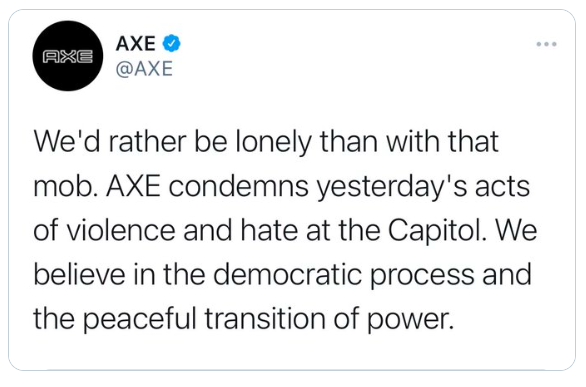Coup attempts are bad for business. WARC’s Cathy Taylor looks at what brands are doing in the wake of the storming of the Capitol.
“Axe Body Spray has come out stronger against the insurrection than the majority of the GOP,” tweeted the anti-Trump Lincoln Project last Thursday, sharing this tweet from the Unilever brand:

The Lincoln Project, a group of former Republicans, is best known for its biting ads during the campaign squarely aimed at getting voters to turn on President Trump. The group pointed out what has become obvious in the harrowing week since the deadly riots and invasion of Capitol Hill: that, in the early days, it was brands, and not necessarily the government, that was quick to draw a line in the sand following the shocking events of January 6.
Admittedly, it is much easier to fire off a tweet than it is to draw up an article of impeachment – let alone get members of the opposing party to sign off on it. But make no mistake; this isn’t just about tweets. Brands are speaking with their money, re-assessing political donations and other political alliances that – for better or for worse – have long been a mainstay of American political culture.
They are no longer worrying quite so much about taking sides in what, in a calmer time, might have been simply another skirmish in the ongoing battle between Democrats and Republicans. As the President was impeached for a second time this past week, corporate dissenters turned their focus to the politicians who actively sought to undermine the results of a fair election, and whose rhetoric motivated the violent insurrectionists who stormed the Capitol.
The list of brands speaking out is long, and growing: the Professional Golf Association cancelled its plans to have the 2022 PGA Championship – one of golf’s four major tournaments – at the Trump National Golf Club in Bedminster, New Jersey, a decision that, according to The New York Times’ Maggie Haberman, left the golf-loving President “gutted.”
Well-known brands including Comcast, Dow Chemical, Marriott International, American Express, Blue Cross, Airbnb, Mastercard, Commerce Bank, Verizon, Northrop Grumman, AT&T, Microsoft, Google, Walmart, Delta Air Lines, Wells Fargo, Bank of America, Disney and more, have said they will suspend all political donations or wouldn’t donate to those politicians which sought to deny Joe Biden the presidency. Deutsche Bank, one of the few financial institutions which did business with Trump prior to his election, also said it would not work with Trump once he was out of out of office. Twitter and Facebook, but also outliers like Pinterest and Shopify, suspended Trump from their services. Parler – a right wing social network – was de-platformed by Amazon, and payment platform Stripe stopped handling the Trump campaign’s payments.
Hallmark’s HALLPAC political action committee, based in Kansas City, even asked for its money back: “The recent actions of Senators Josh Hawley (Missouri) and Roger Marshall (Kansas) do not reflect our company’s values. As a result, HALLPAC requested Sens. Hawley and Marshall to return all HALLPAC campaign contributions.”
As The New York Times’ Ross Douthat put it, the corporate shunning underscores, “the growing distance between right-wing politics and almost every non-political power center in America, from the media and culture industries to the old-line corporate suites to the communications empires of Silicon Valley.”
This distance has been growing for some time, as brands have embraced issues such as sustainability, Black Lives Matter and other causes that are perceived as skewing left. Nonetheless, when it comes to politics, brands have largely hedged their bets, doling out money between the two parties roughly equitably, according to this running chart in The Wall Street Journal of companies which reconsidered their political donations in the last few days.
The problem with coup attempts is that they’re bad for business and that is why the line in the sand is being drawn where it is, now. Many would argue that there have been plenty of times during the Trump Administration when a line could have been drawn by the corporate world, but when bad political actors perform acts that imperil a stable society – well, that’s not so much about drawing a line in which Democrats sit on one side, and Republicans on the other, as it is about deciding between a path toward stability and one going on in another, perilous, direction. For brands, it’s about separating not just money, but the brand’s reputation, from those who would do the country harm – especially at a time when more consumers than ever are concerned with a company’s moral values.
At the end of this month, WARC will publish the first in a series of US Spotlight reports; it will focus on “Marketing in a Polarized Nation.” During an interview for it, I asked the renowned political pollster Mark Penn if a brand could unite the country. Penn said they could certainly contribute; maybe it’s a larger contribution than we thought.

